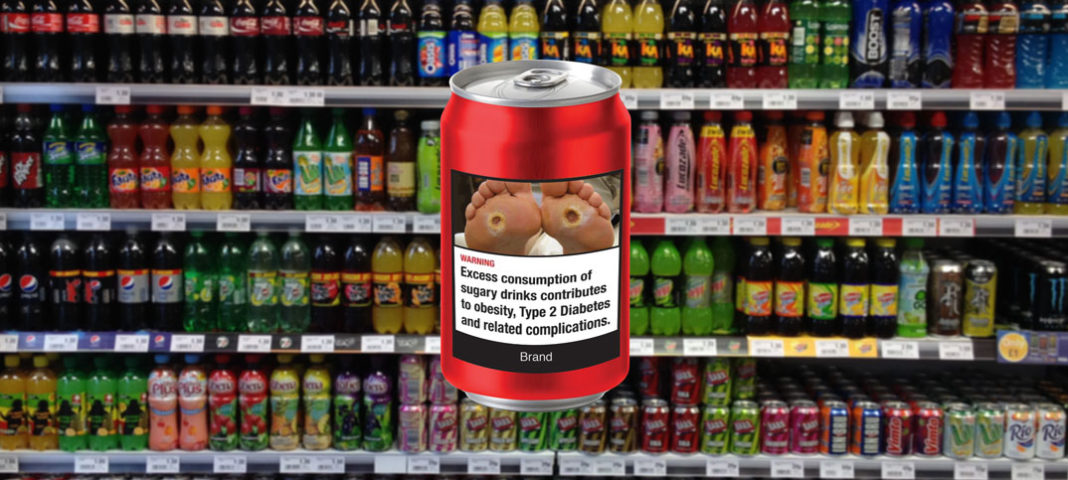|
The Ontario Medical Association in Canada has mocked up images of plain packaging on food and drink products.
Also read, Ottawa has studied ‘soda pop tax’ to tackle obesity, documents show. Christopher Snowdon, head of lifestyle economics at the Institute of Economic Affairs, an independent thinktank, said the move is a significant indicator that plain packaging is likely in the UK. He said the move from Canada puts the UK on a “slippery slope” towards introducing plain packaging on unhealthy foods, with the intellectual property rights of brands such as Cadbury, Coca-Cola and Mars at risk. Alex Scholten, president of the Canadian Convenience Stores Association, told Retail Express that the OMA’s packaging designs were an international concern. “We’re very troubled by this, and we absolutely see it as a threat,” he said. “Not only would it mean challenges for the industry, but it appears the products and services we provide are being singled out as the sole cause of unhealthy lifestyles, which is completely unfair." “In Canada, health advocacy groups are saying plain packaging on tobacco has worked so well it should be used on all unhealthy products." Scholten added that the Association also feared politicians were likely to gravitate towards the same policies as an easy means of raising tax revenue. “Where does this end?" he said. "These are very complex issues, so to single out single products or product categories is extremely unfair – we don’t agree with that approach at all.” Supporting Scholten’s view, Dave Bryans, CEO of the Ontario Convenience Stores Association, argued that plain packaging would not deliver results. “It is unfortunate that the OMA engages in these types of initiatives when it has been proven over and over that education and communication are the best way to change purchasing habits of consumers,” he said. “As proven in the past with tobacco health warnings, consumers of these products do not read the message and any or all changes to tobacco consumption can be attributed to education, aging populations and lifestyle changes." “While we admire the passion of the many advocacy groups in this country we must also defend the rights of our citizens to make informed choices and not allow our stores or products to be the target of this passion.” Bryans added that campaign groups needed to work alongside industry bodies to achieve a positive and mutually beneficial change. “It is time advocacy and industry came together to map out a proper education and communication of alternative options for all,” he said. In Australia, the Gamechanger campaign is pushing for an advertising ban on alcohol and junk food during televised sports games; Snowdon flagged up advertising bans as another sign that plain packaging is on its way. Aaron Schultz, founder of the campaign group, told Retail Express that changes to food packaging were also on its agenda. “We have been pushing for a long time for warnings on junk food,” he said. “Consumers have a right to know what is in their food and the implications for their health. Food descriptions are overly complicated, when clear labelling would offer a simple choice.” Snowdon said if the UK continues with its current policy environment, it was likely there would be a move towards plain packaging on food and drink products. "It’s not imminent, but it is accelerating,” he said, noting that domestic issues, including health campaigns on tobacco policies and academic studies into plain packaging, pointed to the same outcome. “We’ll soon see the introduction of the sugar tax, and there’s talk of advertising bans on certain products, so plain packaging is very much on the cards,” he said. “Based on current trends, fizzy drinks would be the first products to be targeted.” A big issue would be that parents would “definitely” stop buying these products, so Snowdon advised that it would be important to offer healthy alternatives. “It’s far down the line, but we have embarked on the process,” he said. “It’s likely that we’ll follow the same pattern we’ve seen with tobacco – an incremental demonising of the products." “This isn’t some imaginary slippery slope,” he said. “If all of this continues then plain packaging is inevitable.” NFRN chief executive Paul Baxter said: “With plain packaging on cigarettes and other tobacco products shortly coming into stores, parliament has set a precedent and we are concerned that it will only be a matter of time before other lawful food and drink products are next." “We are in discussion with other interested parties in an attempt to prevent this happening.” Source Chloe Taylor, Retail Express
0 Comments
Leave a Reply. |
Advertisement
News & Updates
Stay informed with the latest news around foodservice, agriculture and other related food news. Advertisement Opportunities
|


 RSS Feed
RSS Feed


